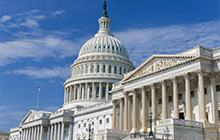On November 10, 2020, the U.S. Senate Committee on Banking, Housing, and Urban Affairs held a virtual hearing entitled “Oversight of Financial Regulators.” The presenting witnesses were: Randal Quarles, Vice Chair for Supervision of the Federal Reserve System; Brian Brooks, Acting Comptroller of the Currency; Jelena McWilliams, Chairman of the Federal Deposit Insurance Corporation (FDIC); and Rodney Hood, Chairman of the National Credit Union Administration (NCUA). The panel provided a six-month update on the state of the banking systems, the impact of the COVID-19 pandemic on financial institutions, and support for small business owners in communities of color.
U.S. Senator Mike Crapo (D-Idaho), Chairman of the Banking Committee, opened the hearing by praising financial regulators for the taking many meaningful steps towards mitigating the economic impact of the COVID-19 pandemic since the passage of the Coronavirus Aid, Relief and Economic Security Act (CARES Act), as well as providing conditions that will lead to economic recovery. Crapo asked the agencies to “continue to carefully review the regulatory and supervisory frameworks, adjusting where necessary to bolster financial institutions’ ability to support economic recovery.” To that end, Crapo urged the agencies to use their discretion “to alleviate the regulatory burdens associated with a variety of asset-based regulatory thresholds on those banks and credit unions temporarily experiencing growth from participation in recovery-oriented programs,” including the Paycheck Protection Program (PPP).
Randal Quarles, Vice Chair for Supervision of the Federal Reserve Board, identified in his written remarks several actions taken in response to the pandemic. These actions include: publishing a set of principles to guide COVID-related credit accommodations; offering new guidance on bank examinations during the pandemic; clarifying its approach to COVID-related activity under the Community Reinvestment Act (CRA); and supporting banks’ ability to address customer needs, including participation in the PPP, underwriting loans in the Main Street Lending Program, and acting as counterparties in several other facilities.
Brian Brooks, Acting Comptroller of the Currency, provided an update on Project REAch, which the OCC created in July 2020 to bring together heads of banking, civil rights, technology, and business organizations to identify and reduce specific barriers that prevent full, equal, and fair participation by underserved populations in the nation’s financial system. In addition to national projects, Acting Comptroller Brooks announced several regional and local projects that focus on developing regional solutions to reduce barriers to economic access for minority communities, including programs in Los Angeles and Minneapolis launched in October 2020.
Jelena McWilliams, FDIC Chairman, provided an update on the FDIC’s work with banks to provide necessary flexibility to work with their customers and support the economy during the COVID-19 crisis, while also maintaining safety and soundness. Chairman McWilliams testified about five areas in which the FDIC has made significant progress: (1) “responding to economic risks related to COVID-19;” (2) enhancing “resolution readiness;” (3) “supporting communities in need;” (4) “fostering technology solutions and encouraging innovation”; and (5) “finalizing outstanding rulemakings.” Chairman McWilliams explained that, motivated by both her personal experiences and her commitment to increasing financial inclusion in traditionally underserved communities, one of her priorities has been expanding the FDIC’s engagement and collaboration in support of minority depository institutions (MDIs). This is of particular importance as the COVID-19 pandemic continues to disrupt the daily lives of all Americans, with minority and low and moderate income communities suffering disproportionately, from both health and economic perspectives. One of the options the FDIC is currently exploring to support MDIs is a framework that would match banks with investors interested in the particular challenges and opportunities facing those institutions and their communities. The FDIC will be releasing more details about this program in the near future.
Rodney Hood, NCUA Chairman, provided an update on the agency’s response to the COVID-19 pandemic. The NCUA issued updated supervisory priorities to account for the pandemic and its economic disruptions, as well as the various statutory and regulatory changes that have occurred. Among the agency’s new supervisory priorities are reviewing credit unions’ good-faith efforts to comply with the CARES Act. The NCUA will also review the actions taken by credit unions to assist borrowers facing financial hardship and the adequacy of credit union loan and lease losses accounts to ensure they can adequately manage the financial and economic disruptions resulting from the pandemic.
The U.S. House Financial Services Committee also held a hearing on November 12, 2020, entitled “Oversight of Prudential Regulators: Ensuring the Safety, Soundness, Diversity, and Accountability of Depository Institutions During the Pandemic,” which featured similar presentations by the same regulators regarding their responses to the pandemic.

